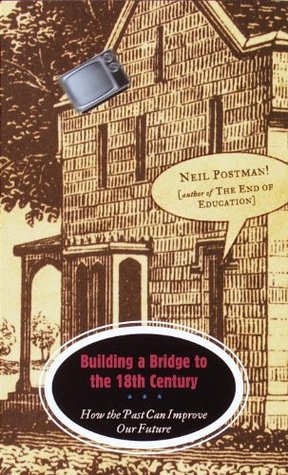More on this book
Kindle Notes & Highlights
by
Neil Postman
Started reading
December 18, 2018
The science they created was almost wholly concerned with questions of truth, not power.
It is Bacon who brought science down from the heavens, including mathematics, which he conceived of as a humble handmaiden to invention.
must lead to a society of continuous improvement.
it was chiefly the eighteenth century that provided Reagan with his ideas,
Malthus argued against ameliorating the lot of the poor,
reason was to be employed as the best means of assisting history’s inevitable movement toward progress.
It is impossible to imagine the height to which may be carried, in a thousand years, the power of man over matter.
express a revulsion against all that reason brings, including the idea of progress.
Rousseau became their enemy, both philosophically and personally.
Kant believed Rousseau’s sensibility of soul to be perfect,
The dispute is usually referred to as “Romanticism versus Rationalism.”
standard-brand rationalist attacking the Church for its encouragement of superstition and its cult of miracles.
His essay won the prize and, even better, made him famous.
He spoke of the confusion printing had produced.
Materialism and atheism, he claimed, went hand in hand, and he thought them demeaning to the human spirit.
amplified the importance of the individual,
why Reason itself was insufficient to produce humane progress.
when science and technology claim to provide ethical imperatives, we are led into moral catastrophe.
Progress is the business of the heart, not the intellect.
a belief in moral and political progress as either inevitable or (at least) possible was retained well into the nineteenth century,
the guillotine, the first mechanized form of execution; it removed, more or less neatly, 20,000 heads.
laws that rewarded with the death penalty those who would destroy machinery.
Kant thought the Jews “a nation of cheats,”
From 1815 to 1853, there were no major wars in Europe.
Based to a considerable extent on Rousseau’s image of childhood, laws were enacted to protect children,
Her crime, it would appear, consisted in damaging the property of others.
our moral universe is more familiar, accessible, and practical than is usually believed.
examples of moral progress, such as the decline of slavery, the elevation of women, the growth of the concept of childhood, and a new appreciation of nature.
The gift of the eighteenth century is to be found in the intelligence and vigor of the questions it raised about progress,
Matthew Arnold warned that “faith in machinery” was humankind’s greatest menace.
the spiritual emptiness that a culture obsessed with progress produces.
economic growth on one hand, the loss of self-respect
the average school superintendent who believes that computers will, at long last, solve the problem of how to educate children.
Alexis de Tocqueville, skeptical of many things he saw in America, believed that technology might bring an end to “the disease of work,”
to many nineteenth-century Americans, technology was clearly the engine of spiritual progress.
For all of Twain’s enthusiasm for the giantism of American industry, the totality of his work is an affirmation of pre-technological values.
the revolutionary thought of Karl Marx, a true child of the Enlightenment and a believer in history’s movement toward progress.
life had progressed from bacteria to humans, from simplicity to complexity, from instinct to consciousness.
We learned how to invent things, and the question of why receded in importance.
the principles through which invention succeeds: objectivity, efficiency, expertise, standardization, measurement, a market economy, and, of course, faith in progress.
particularly the doubt that technological progress goes hand in hand with moral progress.
Among other things, the idea that progress is real, humane, and inevitable died.
if Diderot, Adam Smith, and Jefferson had lived through what we have lived through, they could not possibly have believed in the friendly flow of history.
No one believes, or perhaps ever will again, that history itself is moving inexorably toward a golden age.
He is concerned only that we adapt to our technological future. He nowhere addresses the psychic or social meaning of adaptation.
They are not, literally, questions asked by Enlightenment thinkers, who could not have even imagined the technologies we have invented.
What is the problem to which this technology is the solution?
At death’s door, we may allow ourselves a smile by gasping that we saved a month and a half, and no one will ask, But for what?
This completely misses the point of the power of the spoken word connected to algorithms. Being able to play a specific podcast, for instance, using my voice instead of a traditional podcatcher app, is transformatively easier. This is transformative change, not simply incremental change, particularly when people who did not previously have access to those ideas or to that content are now able to listen or watch.


